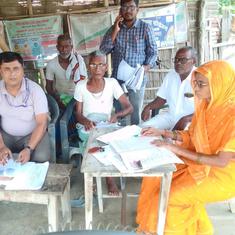Now, a year after the community’s spiritual leader, Syedna Mohammed Burhanuddin, died at the age of 102, the Bohras have repeatedly been in the headlines for a very different reason – an unpleasant dispute between Burhanuddin’s son and half-brother, each claiming to be the rightful successor of the late Syedna.
The battle is currently being fought in the Bombay High Court and has split the community into two factions. This has also led to families being split, couples getting divorces and some members of the community being boycotted socially.
On Monday and Tuesday, as nearly a million Bohras across the world marked the first death anniversary of Burhanuddin, thousands of people flocking to his mausoleum in Mumbai to pay their respects. (Burhanuddin died on January 17, 2014, but his death anniversary is being observed according to the Islamic calendar.)
The massive condolence meet in Mumbai was organised by Burhanuddin’s son Mufaddal Saifuddin, who is widely regarded as the new Syedna and claims to have the support of more than 90% of the community. On Monday, Maharashtra chief minister Devendra Fadnavis also met Saifuddin and paid his respects at Burhanuddin's grave.
The succession dispute
The general belief among Bohras is that Burhanuddin had appointed Saifuddin, his 70-year-old second son, as his successor while recovering from a stroke in 2011.
Last year, however, hours after the Syedna’s death, his half-brother Khuzaima Qutbuddin refuted Saifuddin’s claim to the post, stating that Burhanuddin had appointed him as the successor in a private meeting back in 1965.
Since then, the community has been in a state of turmoil. In April, the Qutbuddin family took the succession dispute to court, seeking legal intervention to prevent Saifuddin from continuing as the Syedna. Also at stake are several extremely valuable religious properties and trusts across the world, including the multi-crore Saifi Burhani Upliftment Trust that is in charge of rebuilding Bhendi Bazar.
The court has placed the onus of proving his claim on Qutbuddin. The case, being heard by Justice Gautam Patel, is in its final stages, with both parties having submitted evidential documents
“For now, both parties have come to an understanding of how this procedure is to be carried out,” said Aziz Qutbuddin, the son of Khuzaima Qutbuddin, who hopes that the final hearings will begin by the end of February.
Growing numbers
For the past year, a small but growing number of Bohras have been leaving Saifuddin’s fold to join Qutbuddin. His supporters claim that at least 500 people openly attend events at his headquarters in Thane, with many more offering support without revealing their identities.
“People are afraid to support us openly because of the overwhelming pressure being exerted over them,” said Aziz Qutbuddin. “However, we get a lot of calls from people who want to pledge their allegiance to my father but wish to remain anonymous.”
Those who openly switched loyalties claim to have faced severe social ostracism.
“Persecution of Qutbuddin’s followers has been increasing – many women have been given a divorce because of it, people’s businesses have suffered and when we go to pray at the grave of Syedna Burhanuddin, we are pushed and cursed,” said K, a Mumbai-based Qutbuddin supporter who did not wish to be named.
When K’s father died in August, he claims he was not allowed to bury him in any of the community’s cemeteries in the city. When his family was finally appointed a cemetery outside Mumbai, K was not allowed to perform any rituals for his father. “I have written to the State Human Rights Commission to complain about this,” hhe said.
Earlier, in July, when Qutbuddin’s sons tried to visit Burhanuddin’s grave in Bhendi Bazar, they were allegedly assaulted by security guards.
Unfair publicity
Meanwhile, the larger section of the community that follows Saifuddin claims that the situation is not as bad as the media has made it out to be.
“People are not really upset about the split in the community, but they do panic when they read about it in the media,” said Shabbir Qamari, a follower of Saifuddin from Bhendi Bazar. “There has been some negative publicity of the community in the past year, but it’s not true that many families have split because of the dispute – just one or two instances have occurred.”
Saifuddin’s supporters, however, have also had to face dissent from within in the past year, with some members upset over their leader’s regressive views on women.
Saifuddin has allegedly advised that women should not be sent to university but should instead be taught how to stitch and make rotis. He has also said that working in “call centres” and wearing non-traditional clothes could lead to sin.










